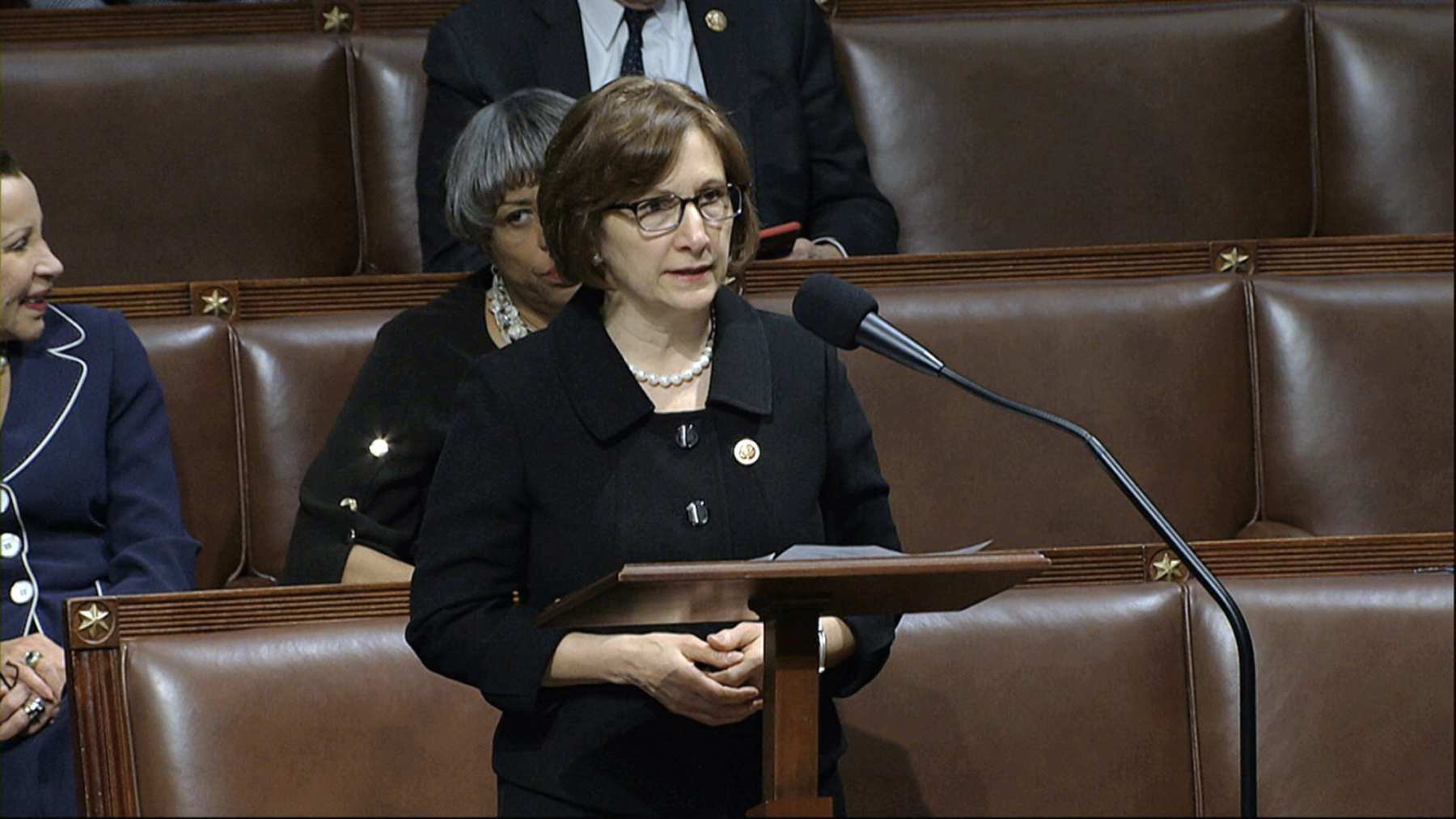About one month after pro-Trump rioters stormed the U.S. Capitol, The 19th reached out to all 143 women in the 117th Congress to ask about their experiences on January 6. Twenty-three shared their points of view from that day. We are also publishing each lawmaker’s full account of that day. Here is what Rep. Suzanne Bonamici of Oregon told The 19th. The transcript has been lightly edited:
It’s been almost a month, but it feels like just yesterday.
We were sworn in to our positions on the 3rd, and then the next couple of days were organizational work. We knew coming up to the 6th, there would be protests. There are frequently protests at the Capitol, but we got an alert saying it might be a good idea to get into your offices early in the event that some entrances are blocked.
We got into the office around 9 a.m. that day even though the proceeding didn’t start until 1 p.m. I had read the night before — a colleague had shared an article from the Washingtonian — that people were sharing maps of the underground tunnels. The feeling I got from this is “how absurd that they think they can get into the tunnels, a secure location.” I read the article and thought, “Well, gosh, they’re not going into the tunnel because there’s so much security.”
It’s not that I ignored it. I’ve worked here nine years, and it’s always felt safe and secure. So that morning, I got here at 9 a.m., doing some work and kind of watching the news. I knew the former president was speaking, so I turned that on and saw the size of the crowd. There were a lot of people. I thought they’ll get here and maybe they’ll make a lot of noise, but they’re not going to get in.
It got to be 1 p.m., and the proceeding started. With COVID, there’s a limited number of people on the floor. This is something that only happens every four years, so I put in a request to sit in the gallery. I had asked my chief of staff if I was approved, but she said, “No, not yet,” so I’m going to watch from my office.
First thing I remember happening was seeing an alert that there was a potential explosive device that was found. There were two: one at the RNC and one at the DNC. Then I saw that the Cannon office building was being evacuated.
It kind of seemed like a fire drill, but I know they’re not going to be doing an evacuation drill on a day like this, when all of Congress is here. The Cannon office building is near the RNC.
The next thing I remember is the squawk box in my office started making a very, very loud siren-like sound, and I got scared. It had never gone off before. I was glad my staff was here with me. Once we heard that, we received text and email alerts from Capitol police. There was an external threat. That means curtains closed, doors locked, lights down and be quiet.
Maybe the protesters are shooting, I thought. I was on the second floor. My office looks out on the opposite side, away from where the mob was. I see about a dozen people — not the mob. So we shut the curtains and made sure the doors were locked. We tried to be quiet. We have emergency supplies, so we get out gas masks. My chief of staff, she just did it. This was between 1 and 2 p.m.
So then we had backpacks, a communication device strapped on my bag just in case my phone connection went down. The floor proceeding looks chaotic on the screen. But then I start checking my phone, a couple group chats of colleagues — mostly women. People are texting: “There’s been a breach.”
We go to an inner office, away from windows, and we’re watching the television news. We’re following what’s happening and realize they got into the building. My first thought was, “Where is the backup?” Next thing I remember was a text from a colleague saying that shots have been fired — which was what was really terrifying — without any information about where, how many, inside or outside.
Because of the article I’d read the night before about a map of the tunnels, we don’t know where they are. We’re not getting communication about that. We’re trying to be quiet in the center office but watching and following along. I’m watching it play out. My family, friends, husband and son are texting me: “Are you OK? Where are you?” I’m just trying to follow what’s happening.
Then I began hearing about colleagues locked in little rooms near the gallery that are hearing people right outside the door.
I only heard a couple of footsteps, but we just kind of listened and they walked by. I know other people are in their offices, so we just didn’t open our doors. We’re waiting, waiting, and I keep thinking, “Where in the world is the backup if the mob has overcome the Capitol police and others?”
I think the frustration and anger reached a high point when Donald Trump came out and spoke in the afternoon. We didn’t leave the office, but he said, “We love you. We support you. Please go home,” which was a completely inadequate response that made me furious. You told these people to come here. You think “I love you” is sufficient when they’re hunting members of Congress. That was a really angry moment.
We continued to wait and hear from friends and family. “We’re OK and sheltering in place.”
What about my colleagues who were actually in the Capitol? I was worried sick about whether they were safe. I was in Rayburn, but the buildings are all connected by tunnels. So when I leave to vote, it takes about 10 minutes to get there.
We continued to watch things play out on the news, just watching and trying to figure out where they were: Statuary Hall, the rotunda, the speaker’s office. “Where is that? Where are they? Are they close to members of Congress or senators?” And just feeling sick about what was happening, terrified that they would reach members of Congress or staff. Watching them physically harm the Capitol Police was just awful.
Watching them physically harm the Capitol Police was just awful.
Rep. Suzanne Bonamici of Oregon
We got a few more of the external threat alerts, telling us to turn off your lights and close your doors. And then, probably later at night, I remember hearing that the House and Senate are going to continue the proceeding. All clear.
At that point, when you hear that there’s an all clear, the instinct is to go far away from this building before this building can be invaded again. The instinct is to get out of here. We recognized, looking back on it, that we had to finish our work and certify the Electoral College results. Otherwise, the mob would have won, and the terrorists would have achieved what they wanted to achieve.
About 10 or 10:30 p.m., they called us to vote, and that’s the first time I left my office. I was a little worried about going through the tunnel. I asked my colleague from Oregon, two floors down from me: “Can I walk to the floor with you?” I didn’t want to walk there by myself. No one came and checked on us. The Capitol Police never asked if we were there or if we were OK. We never heard anything like that. [Rep. Peter DeFazio] and I walked. He had his bear spray with him — very Oregonian of him. We’re really just supposed to vote and leave the floor because of COVID.
There was a message, maybe through a text or email, that said don’t come through the speaker’s lobby. Don’t come through that. There’s two entrances there. And somebody said, “Why?” Somebody said, “It’s a crime scene.”
The women’s room just happens to be there off the floor in the back, and it’s a place where people typically wait between votes. We spend a lot of time there as members of Congress. To say, “Don’t come in those doors; it’s an active crime scene,” was really shocking and terrifying. As it turns out, the woman who was shot and killed was right there at the place I walk by every time I vote.
I walked by there this morning, and every time I walk by there, it’s sort of traumatizing to think that someone was killed there climbing through the window, trying to get members of Congress. The whole thing is traumatic. There’s now large fences, barbed wire at the top, and very large numbers of armed troops around.
In between the Arizona and Pennsylvania votes around midnight, I tried to take a little nap in my office. I was physically, emotionally and mentally exhausted, but I couldn’t even close my eyes. What if someone tries to knock on the door? What if someone got in my hallway? I didn’t rest. When the vote on Pennsylvania happened, probably between 2:30 and 3 a.m., we had that final vote and then left the campus.
When I got back to my apartment, I locked the door and called my husband. Maybe at that point, I felt some sort of relief but not really. It was traumatic. To know that that happened in this building. I walked the other day into the rotunda to pay respects to Officer Brian Sicknick, who was killed, the two officers who committed suicide after the event and the numerous, numerous members of the Capitol police who have been injured.
It’s tragic. And I think this is something — speaking for myself but I also know most of my colleagues would agree — that you can’t forget or recover from quickly. I think about all the new members of Congress. They don’t know the building. At least I knew escape routes if I needed them. It’s easy to get lost in this complex.
I wanted to be reassuring because my family isn’t close by when I’m in D.C., so I wanted to be reassuring to them. Because I was in my office, I could talk on the phone and text. I felt like I’m OK and that was the message I needed to send.
It is hard to relive. I frequently think of how much worse it could have been. That’s a tiny bit of consolation. It shouldn’t have happened. No reason why [that happened] in the U.S., a country with a democracy, and a peaceful transfer of power is a part of that. This riotous mob was instigated by the then-president of the United States. History is going to look back at this as a very challenging time for our country. The message is we didn’t let them win. We certified the Electoral College. There was the inauguration, a new president and vice president. That’s what an election is about. As a country, we need to examine how and why did this happen? That can be answered with a lot of criminal investigations, but we also need to look from a political perspective.






